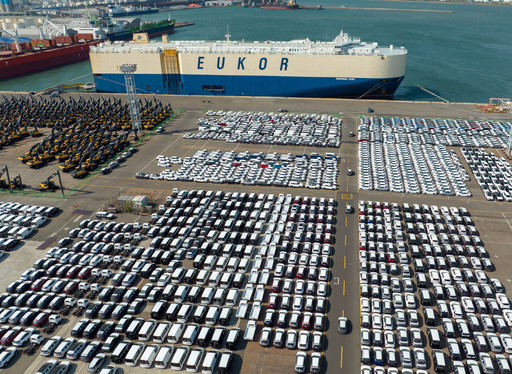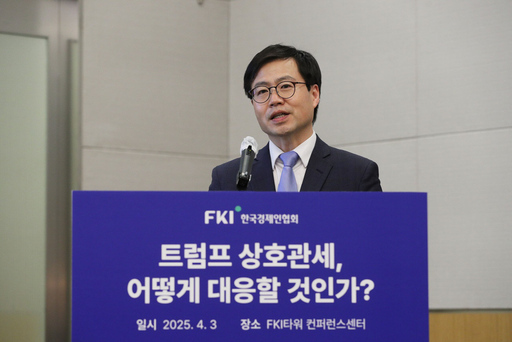


U.S. President Donald Trump announced on the morning of the 3rd (Korean time) that a 10% basic tariff will be imposed on all imports entering the U.S., along with additional reciprocal tariffs on key countries. The announcement included a 25% reciprocal tariff on South Korea, 34% on China, 20% on the European Union (EU), 46% on Vietnam, 32% on Taiwan, and 24% on Japan. Domestic industries, including the automotive sector, are facing what is referred to as a "perfect storm" (a combination of crises). In particular, South Korean companies operating in Vietnam and China are expected to face the highest levels of pressure.

◆Impact inevitable… "Government must negotiate actively"
Domestic automakers have avoided reciprocal tariffs, but the imposition of tariffs on imported cars is expected to significantly impact their performance. Last year, South Korea's automobile production totaled 4.13 million units, of which 2.78 million units were exported, accounting for 67% of total production. Of these, 1.43 million units were exported to the U.S. (Hyundai Motor and Kia with 1.01 million units, and GM Korea with 410,000 units), making up 35% of total production and 51% of total exports. The value of U.S. automobile exports was recorded at $34.744 billion (50 trillion won).
The industry forecasts that the imposition of tariffs on imported cars could lead to a $6.3 billion (approximately 9 trillion won) decrease in South Korea's automobile export value compared to last year.
Hyundai Motor Group, the largest domestic automaker, is also expected to face worsening performance. Industry experts predict that the annual profit decline for Hyundai and Kia could reach 3.4 trillion won and 2.3 trillion won, respectively, due to the tariffs.
However, it is expected that costs will decrease significantly if Hyundai Motor Group expands the annual production capacity of its recently launched MetaPlant America (HMGMA) in Georgia from 300,000 to 500,000 units. Hyundai Motor Group operates three plants in the U.S.—the Hyundai Alabama Plant (330,000 units), Kia Georgia Plant (350,000 units), and MetaPlant America (300,000 units)—with a combined production capacity of 1 million units. Kia's CEO Song Ho-sung stated, "40% of the vehicles produced at HMGMA will be Kia vehicles," and regarding concerns about price hikes due to the second Trump administration's tariffs, he said, "We have not reviewed this yet."
Separately, GM Korea, which exports 84% of its total production to North America, is facing heightened anxiety due to the "tariff bomb." GM Korea has been increasing sales in the U.S. with value-oriented models like the Trailblazer and Trax, but if tariffs lead to price increases, maintaining sales volumes may become challenging. Some are concerned that, similar to the Gunsan plant, GM Korea may initiate restructuring.
Professor Kim Pil-soo of Daelim University's Department of Automotive Engineering said, "While the impact on automakers is inevitable, it is fortunate that the gap with competitor countries like Japan and Europe is not significant." He added, "Since domestic automakers have secured enough resources to withstand up to three months, the government should actively engage in negotiations." He emphasized, "If companies collapse, recovery will be impossible, and the entire industry ecosystem will collapse, so the government and local governments must prepare emergency support measures such as export vouchers, tax benefits, subsidies, and additional budget allocation."

◆Reciprocal tariffs on semiconductors and steel in 'standby mode'
Steel and aluminum companies that have already been subjected to tariffs have avoided the duplication of reciprocal tariffs. However, the steel industry remains cautious, as it is closely linked to other industries and is keeping a close watch on the impact of tariffs.
The semiconductor industry has been excluded from the reciprocal tariff imposition, providing some relief. However, since the U.S. government has indicated that a minimum 25% tariff will be applied to specific semiconductor items, it is still not a time for complete reassurance. South Korea’s semiconductor exports to the U.S. account for 7.5%, which is relatively lower compared to China (32.8%), Hong Kong (18.4%), and Taiwan (15.2%). However, since semiconductors are often manufactured through multiple countries, there are concerns that the scope and criteria for reciprocal tariffs could result in a larger-than-expected tariff burden.
As of now, the specific scope and criteria for applying item-specific tariffs on semiconductors have not been disclosed. Some analysts suggest that since companies like Samsung Electronics and SK hynix lead the production of advanced semiconductors, such as high-bandwidth memory (HBM), and there are no substitutes for these semiconductors, the item-specific tariffs might be reduced.

◆Business community expresses strong concern over U.S. tariff "bomb"
The business community has called for future "policy coordination" between the South Korean and U.S. governments in response to the U.S. administration's decision to impose a 25% reciprocal tariff on South Korea.
In a statement on the 3rd, the Korea Chamber of Commerce and Industry (KCCI) stated, "The reciprocal tariff policy announced by President Trump is a significant measure that could bring about major changes not only in trade between South Korea and the U.S. but also in the global trade order." It continued, "South Korea and the U.S. have developed a mutually beneficial economic partnership based on the Free Trade Agreement (FTA), and South Korean companies have contributed to the U.S. economy and industrial development through active investments and the creation of quality jobs in key industries such as semiconductors and automobiles."
The KCCI also expressed hope that "in the implementation of the reciprocal tariffs, close communication and policy coordination between the governments of both countries will take place based on the trust built over time."
The Korea Economic Association (KEA) held an emergency seminar at the FKI Tower in Yeouido, Seoul, to discuss ways to respond to the tariff pressure from the Trump administration.
Yuh Han-koo, a senior researcher at the Peterson Institute for International Economics (PIIE) and former head of the Trade Negotiations Bureau at the Ministry of Trade, Industry, and Energy, analyzed that the Trump administration's tariff imposition has a political intention that goes beyond mere protectionism. He stated, "The tariffs are seen as a means to secure revenue for tax cuts," adding, "Compared to the first term, the speed, scope, and scale are much more aggressive." However, he cautioned against excessive concerns that might paralyze the industry, saying, "The basis for calculating the tariffs has not even been disclosed. We should not be swayed by such policy announcements and should keep an eye on the long-term trends."
Jo Sung-dae, director of the Trade Research Division at the Korea International Trade Association, stated, "The tariff burden will be greater for industries that compete with U.S. companies." He added, "A 'race' has started with other countries that will be negotiating with the U.S.," and advised businesses to find practical responses such as adjusting production volumes and seeking alternative supply chains.
ChatGPT를 사용하여 번역한 기사입니다.


 Copyright ⓒ 메트로신문 & metroseoul.co.kr
Copyright ⓒ 메트로신문 & metroseoul.co.kr
Copyright ⓒ Metro. All rights reserved. (주)메트로미디어의 모든 기사 또는 컨텐츠에 대한 무단 전재ㆍ복사ㆍ배포를 금합니다.
주식회사 메트로미디어 · 서울특별시 종로구 자하문로17길 18 ㅣ Tel : 02. 721. 9800 / Fax : 02. 730. 2882
문의메일 : webmaster@metroseoul.co.kr ㅣ 대표이사 · 발행인 · 편집인 : 이장규 ㅣ 신문사업 등록번호 : 서울, 가00206
인터넷신문 등록번호 : 서울, 아02546 ㅣ 등록일 : 2013년 3월 20일 ㅣ 제호 : 메트로신문
사업자등록번호 : 242-88-00131 ISSN : 2635-9219 ㅣ 청소년 보호책임자 및 고충처리인 : 안대성